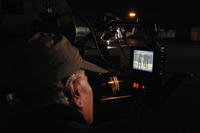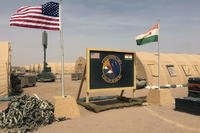The sixth and newest U.S. military service may also be the one most appealing to and inclusive of women.
Air Force Maj. Gen. Clinton Crosier, director of planning for U.S. Space Force, said the service is actively seeking ways to incorporate policies that allow for career flexibility and generous family and caregiver leave, and create a culture of equality and inclusion.
"We have not yet developed or built what are the core values of the Space Force," he said Tuesday in a presentation to the Defense Advisory Committee on Women in the Services. "I tell you what, diversity and inclusion has got to be part of it from the foundational level."
The older military services have grappled publicly with the challenge of attracting and retaining female members, particularly at the mid-career level. In the Marine Corps, the most male-dominated of the services, Commandant Gen. David Berger recently announced plans to pursue a one-year maternity leave period for new mothers.
Related: Here Are the 16 Jobs that Will Be Available to Troops in US Space Force
Crosier said lawmakers have supported giving the architects of Space Force a free hand to design the structure they need for an effective service.
"We have a real opportunity, a real opportunity to shape what the U.S. Space Force looks like from the ground level," he said. "How do we bake [flexibility] into our baseline policies, not trying to come from the outside to get waivers or something else. Congress has essentially told [Chief of Space Operations Gen. John Raymond], if you think you need a policy or authority that you don't have today, bring it back in the form of a formal submission."
Space Force wants to set itself apart culturally, as well.
"We are working right now on what we call space professionals," Crosier said. "[The new term] won't have 'man' in it. It won't be a term like 'spacemen.' It won't be a term that conjures up gender."
In the briefing, Crosier also revealed the five areas of emphasis and 16 job specialties that will be available to troops in the Space Force. They all fall under the category of Science, Technology, Engineering and Mathematics, or STEM -- a field in which women are historically underrepresented. However, Crosier noted, the service will also be courting experts and specialists from industry and academia -- and those individuals are likely to be attracted by the same flexibility, nontraditional career paths and sabbatical programs that have been central to the services' efforts to keep female troops.
"We have a lot of opportunities for women with STEM capabilities. If you have a STEM background, training and education, there is a high probability that you have a home in the U.S. Space Force," he said.
As the Space Force builds its small initial cadre, women already have representation. The service's first civilian hire, he said, was Patricia Mulcahy, formerly the deputy assistant secretary of the Air Force for Force Management Integration. Now the Space Force's director of Manpower and Personnel, she'll be in charge of kicking off a new, 21st century human capital management strategy, Crosier said.
Also high in the ranks is Maj. Gen. Nina Armagno, director of Space Programs, a career expert in space operations.
"What it does show with these two hires is there is tremendous opportunity for women in the U.S. Space Force," Crosier said.
-- Hope Hodge Seck can be reached at hope.seck@military.com. Follow her on Twitter at @HopeSeck.
Read more: The Air Force Is Calling Off Its 'Fly-Only' Track Experiment













